‘Bros’ asks, ‘What makes a relationship work?’
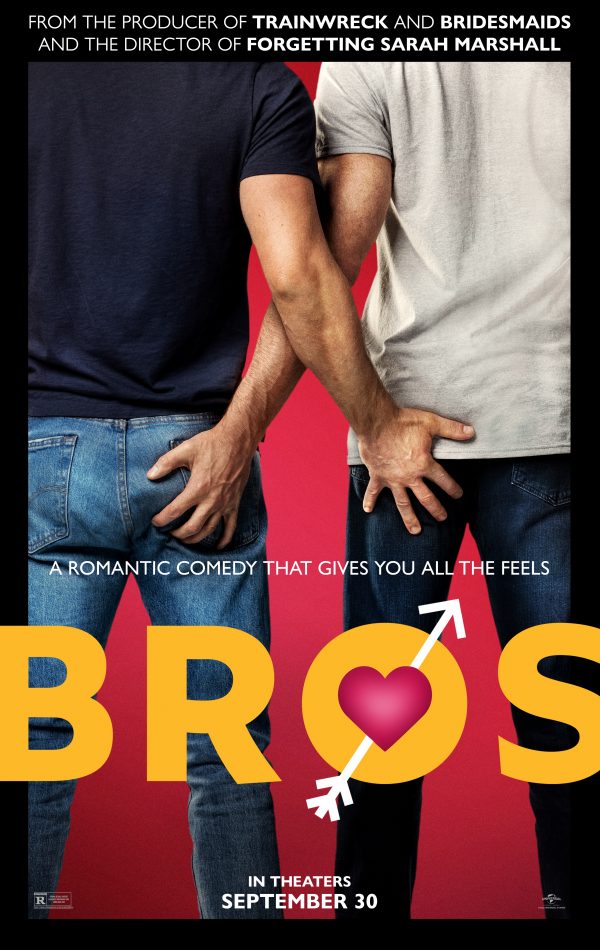
“Bros” (2022). Cast: Billy Eichner, Luke Macfarlane, Debra Messing, Harvey Fierstein, Guy Branum, Amanda Bearse, Ryan Faucett, Miss Lawrence, TS Madison, Dot-Marie Jones, Jim Rash, Eve Lindley, Bowen Yang, Monica Raymund, Guillermo Diaz, Jai Rodriguez, Peter Kim, Justin Covington, Symone, Brock Ciarlelli, Kristin Chenoweth, Amy Schumer, Kenan Thompson, Ben Stiller (uncredited). Director: Nicholas Stoller. Screenplay: Billy Eichner and Nicholas Stoller. Web site. Trailer.
And he wonders why he has trouble getting dates.
Because of this lack of a social life, Bobby’s thrown himself into his work. He tirelessly seeks to build consensus for museum projects and fund-raising efforts among his often-squabbling board members (Miss Lawrence, TS Madison, Jim Rash, Dot-Marie Jones, Eve Lindley), though, considering the petty arguments he often has to settle, he just might have better luck spending his time cruising social media for connections. Still, he hasn’t given up on dating completely and makes the rounds at the bars and community events to see what the field has to offer.
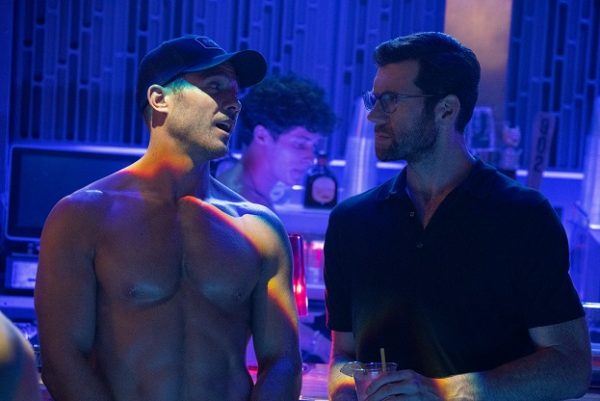
While attending a reception for a new work project of his friend, Henry (Guy Branum), Bobby spies a handsome hunk, Aaron (Luke Macfarlane). They strike up a conversation, and a few sparks fly, but Bobby gets the distinct impression that he’s not Aaron’s type. In subsequent encounters, however, that conclusion doesn’t appear to play out. They begin spending more time together, and Aaron even helps Bobby tone down some of his rhetoric, especially when it comes to helping him secure financing for the museum’s fund-raising efforts. But, despite such progress, the connection still seems somewhat tentative, even when the newly emerging couple meets with Bobby’s friends and Aaron’s family.
So how will that all play out? It depends on a number of factors, such as each partner trying to decide how strongly each is willing to commit to one another – which, in turn, depends on how strongly they’re physically and emotionally attracted to one another, particularly when one of Aaron’s old high school crushes (Ryan Faucett) comes out and begins making a play for him. Then there’s the question of how well their personalities mesh – and whether the chemistry is sufficient enough to make up for any deficiencies in physical attraction. And, of course, there’s the biggest variable of all – do they truly love one another?
Does boy get boy or boy lose boy in this scenario? And what do others looking on from the sidelines have to say? As noted above, who knows why relationships succeed or fail. In this, as in virtually any other case, you’ll just have to sit back and watch to find out.
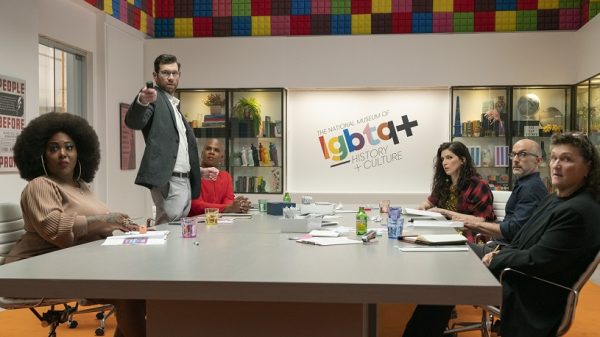
That last part – for better or worse – is especially important when it comes to our beliefs about relationships, particularly those that pertain to more serious commitments, like marriage. The beliefs we hold in this regard play an important role in determining whether those connections ultimately succeed or fail. And that’s patently obvious where Bobby and Aaron are concerned. They each need to sort out their thoughts, beliefs and intents where commitment is involved, both individually and as a couple. That’s no easy task, either, given the considerable belief baggage that each of them is carrying around in terms of what they want, who they believe is acceptable and even who they believe is available.
Those are concerns that often make it easy to see why gay male relationships sputter – and frequently after short periods of time. This is not meant to suggest that such arrangements can’t work; many do. However, such circumstances are indicative of the fact that many would-be partners don’t make an adequate effort to assess these issues before leaping into their involvements. They either don’t examine their underlying beliefs at all, or they may place too much emphasis on belief considerations that aren’t significant enough to what makes a relationship succeed. Ancillary concerns could be given far too much weight, and, when these involvements don’t pan out as hoped for, they quickly head south, frequently prompting many gay men to give up on the idea that a successful relationship is even possible.
In order for this to happen, it’s incumbent upon relationship seekers to put in the effort and do the work when it comes to their beliefs. Conducting such assessments may not be easy, because it may be a practice we’ve never engaged in before. Or it may be difficult to pinpoint the answers to questions like those posed above. Either way, though, moving forward without taking this step is a genuine crapshoot, a recipe for uncertainty and possible disappointment.
It’s also important to recognize that we must look to ourselves for these answers, that they’re not something that resides outside of us, a place many of us erroneously turn to, regardless of what type of relationship we’re looking for. Now there’s nothing wrong with seeking out the advice of a sounding board, such as Bobby does in the film when he engages in a hilarious consultation with Will & Grace star Debra Messing, a would-be museum benefactor playing a fictitious version of herself. But, as the longstanding gay-friendly icon pointedly asserts, we must all find our own paths, especially in matters as personal and intimate as our relationships. To do otherwise could potentially leave us standing on the outside looking in, never finding what we’re searching for and living a life in solitude. Do we really want that?
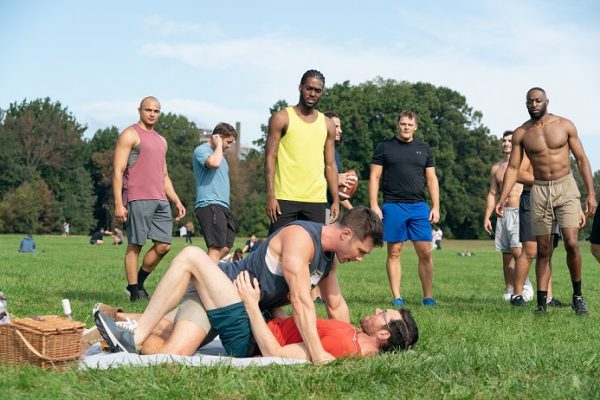
We also need to take account of the fact that our beliefs can change over time. What we believe in our 20s, for instance, could be drastically different from what we believe in our 50s. It’s not unrealistic to think that such alterations can occur, either, based on our personal experiences and shifts in social consciousness. Consider, for example, how public opinion has changed with regard to the view of same-sex marriage over time. What may have been viewed as unthinkable several decades ago is now generally accepted and the law of the land. If belief changes like that can happen in society at large, is it unrealistic to think that the same can’t happen in an individual’s beliefs, too?
So what’s the answer – what ultimately determines success or failure in a relationship? Given that we each create our own reality, there’s no single answer, no one size that fits all. But the common denominator in each case is what beliefs we hold and how well they mesh with those of another, the co-creation we forge together and how well that particular fusion works. Like much of life, this undertaking is a journey, one of discovery, revelation and understanding to see how well that mix combines to create a harmonious outcome. If we get it wrong, we can always try again. But, if it succeeds, there’s nothing like it, a genuine illustration of the joy and power of creation at work.
“Bros” has had an unusual reception in the movie marketplace. It’s been a critical success despite its underperformance at the box office, yet it’s a film genuinely worth seeing, regardless of one’s sexual orientation. In some ways, this picture employs an adapted version of a rather tried-and-true movie formula of boy-gets-boy/boy-loses-boy/boy-gets-boy-back-after-a-series-of-extracurricular-flings, an approach that has earned the film its share of criticism from both gay and straight camps. However, given the universal relationship subjects it addresses, I like to think of the film as a sort of gay male version of “Annie Hall” (1977). I love the way that its basic narrative is dressed up with snappy, often-hilarious writing, ample situational and sight gags, and just the right amount of heart-tugging, inspirational drama (without becoming schmaltzy or overly preachy). Virtually all of the humor is positively spot-on, and it’s served up in an easily relatable way such that one need not be a card-carrying member of the LGBTQ+ community to grasp the jokes. The film also features an array of appearances by gay and gay-friendly icons like Debra Messing, Harvey Fierstein and Kristin Chenoweth, a variety of cameo appearances by big name Hollywood stars, and a host of gay, lesbian, bisexual and transgender performers.
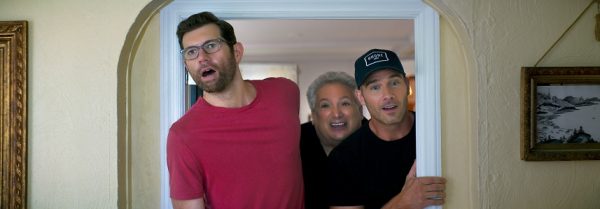
It’s also worth noting that the film’s principal producer/distributor, Universal Pictures, deserves a hearty round of applause for taking a chance on material like this. Indeed, the backing of a romantic comedy involving alternative lifestyles by a mainstream studio is truly groundbreaking in the movie industry. And, even though the film probably would have performed better financially as a summertime release, when it wasn’t competing with as many Halloween- and horror-related offerings, it’s still an artistic success in many other regards. I’d like to hope that this savvy move by a major industry player opens the door to greenlighting future projects of a similar nature, a rich vein of material that’s just waiting to be mined. Sensitive viewers should be aware that there is some explicit sexual content in this release, but, considering the comic nature of much of it, it’s hard to envision it not evoking laughs from even the most conservative audience members. Given how well this offering succeeds on so many fronts, it would be a shame if it were to be overlooked come awards season, especially when it comes to its writing. It’s refreshing to see a film that finally knocks it out of the park this year – and this truly is the one to have done it.
Copyright © 2022, by Brent Marchant. All rights reserved.



